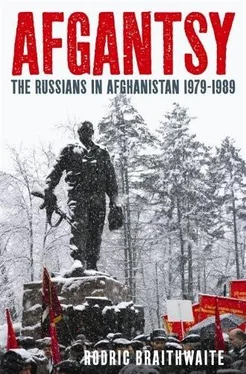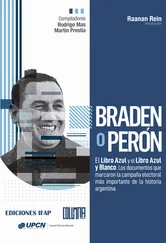General Zaplatin was not recalled until 10 December, as the final decisions were being taken. Once again he told Ogarkov and Ustinov that the Afghan army was up to the job. Amin, he said, had given not the slightest sign of wavering in his loyalty to the Soviet Union. Ustinov said irritably, ‘You people in Kabul keep on coming up with differing assessments. But we here have to take decisions.’ There was no mention of sending in the troops, though Ogarkov did mutter something about the possibility of military action. Zaplatin said roundly that he saw no need for any such thing. 26
And so those senior Soviet officials who had doubts about the use of military force were sidelined or ignored. Only the KGB representatives in Kabul seem to have argued consistently in favour of getting rid of Amin. When the crisis peaked, the senior Soviet officials in the Afghan capital were men with little or no experience of the country.
The situation in Afghanistan continued to deteriorate. In an attempt to place the blame for the excesses on his predecessor, Amin published in November an official list of twelve thousand people who had been liquidated since the coup in April 1978. But he nevertheless stepped up his own use of terror against his opponents. He kept a portrait of Stalin on his desk and brushed off Soviet remonstrations with the remark, ‘Comrade Stalin showed us how to build socialism in a backward country: it’s painful to begin with, but afterwards everything turns out just fine.’ According to one foreign scholar, in the period between the Communist coup and the Soviet invasion twenty-seven thousand people may have been executed in the Pul-i Charkhi prison alone. After the invasion, mass graves were discovered at Herat and Bamyan. Other estimates put the number of people killed in the course of 1979 at fifty thousand or more. Many Afghans sought refuge in exile in Pakistan or Iran. As usual there can be no certainty about the figures. 27
Despite the repressions, the unrest continued. In mid-October there were mutinies in the 7th Infantry Division, which was based on the outskirts of Kabul. Amin used regular forces and air strikes to discipline tribes that failed to obey his commands. The measures were insufficient. Amin controlled only 20 per cent of the country, and the proportion was steadily shrinking.
The Soviet leadership was still wavering over the decision to mount a major military action. Nothing had happened to alter their basic assessment, now eight months old, that the involvement of Soviet troops in Afghanistan would have damaging consequences for Soviet interests. But events were now accelerating beyond their control and preparations for a forceful change of government in Kabul began to take concrete form.
At the beginning of November the KGB brought Babrak Karmal and other potential members of an alternative Afghan government to Moscow.
The first military deployment directly connected with a possible operation against Amin was not authorised until 6 December. On that day the Politburo endorsed a proposal by Andropov and Ogarkov to despatch a detachment of five hundred men to Kabul, without any attempt to disguise their membership of the Soviet armed forces. After all, Amin had repeatedly pressed for the Russians to send a motor-rifle battalion to protect his residence.
On 8 December Brezhnev met Andropov, Gromyko, Suslov (1902–82), and Ustinov to discuss the situation at length, and to weigh the pros and cons of introducing Soviet forces. No record of this meeting has yet surfaced.
On 10 December Ustinov called Ogarkov into his office and told him that the Politburo had taken the preliminary decision to send troops into Afghanistan on a temporary basis. He ordered Ogarkov to devise a plan to deploy 75–80,000 troops. Ogarkov was surprised and angered. He was against sending any troops, because it made no sense. A force of seventy-five thousand was too small to do the job anyway. Ustinov ticked him off sharply. Ogarkov’s job was not to teach the Politburo its business but to carry out its orders.
Ogarkov was called into Brezhnev’s office later the same day. Andropov, Gromyko, and Ustinov were already there. Ogarkov reiterated his arguments: the Afghan problem had to be settled by political means; the Afghans had never tolerated the presence of foreigners on their soil; the Soviet troops would probably be drawn into military operations whether they liked it or not. His arguments fell on deaf ears, though he was assured that the executive decision to send the soldiers had not yet been taken.
That evening Ustinov told a meeting of senior officials in the Ministry of Defence that a decision to use force in Afghanistan would be taken shortly. From then onwards he issued a stream of verbal directives which the general staff converted into written orders. 28The forces on the Afghan frontier were mobilised, and parachute and other elite units were sent to Turkestan from their bases all round the country.
The crucial meeting of the Politburo took place on 12 December. Those present included Brezhnev, Suslov, Andropov, Ustinov, and Gromyko. Others were also present, though the story has got around that they were excluded. 29The meeting had before it a note from Andropov which said that following the murder of Taraki the situation in the party, the army, and the government apparatus had become more acute as a result of the mass repressions carried out by Amin.
Andropov made particular play with the stories of Amin’s increasing contacts with the West. There was evidence, he said, that Amin had had contacts with the CIA, who may have recruited him while he was studying in the United States in the 1960s. The CIA were attempting to set up a ‘New Great Ottoman Empire’ to embrace also the southern republics of the Soviet Union. Soviet anti-aircraft defences were inadequate to defend targets in the southern republics, such as the cosmodrome in Baikonur, if the Americans installed missiles in Afghanistan. Afghanistan’s uranium resources might become available to the Iranians and Pakistanis. The Pakistanis might successfully attempt to detach the southern provinces of Afghanistan. If Amin were indeed to shift Afghanistan’s foreign policy decisively towards the West, it would be a serious setback to the long-standing Soviet aim—which went back to Khrushchev and beyond—of keeping Afghanistan orderly and friendly as a buffer on the southern border of the Soviet Union. Meanwhile anti-Soviet sentiment in Afghanistan was on the increase. Babrak Karmal and other Afghan exiles were asking the Soviets to help change the political situation in Afghanistan, if necessary by force of arms. The Soviet Union should act decisively to replace Amin and shore up the regime.
These arguments were not entirely specious. In 1979 CIA experts looked at the possibility of moving to Afghanistan the electronic intelligence facilities in Iran that had been closed down by Khomeini. 30At the beginning of November American diplomats had been taken hostage in Tehran, and US policy had become more unpredictable. Soviet fears about the impact of events in Afghanistan on the security of Central Soviet Asia turned out retrospectively to have some justification when first the mujahedin and then the Taliban began to operate in Tajikistan and Uzbekistan alongside the Islamist opposition. 31
Western and even Russian historians have tended to argue that the Russians were being paranoid, or that they were inventing reasons to justify their invasion. There may have been an element of that. But in the overwrought atmosphere of the Cold War each side was prone to exaggerate the threat from the other, and to engage in worst-case analysis—so much safer than simply hoping for the best. Later commentators have made much of the coincidence that NATO’s decision to deploy Pershing II missiles in Europe was taken on the same day as the Politburo took its fateful decision on Afghanistan. Given the complex and confused way in which decisions are taken by most governments, it is unlikely that the news would have had much effect on the Politburo, even if it had reached them in time.
Читать дальше












